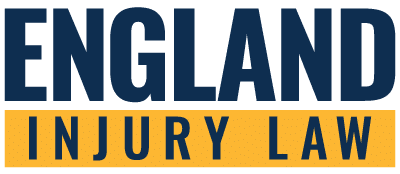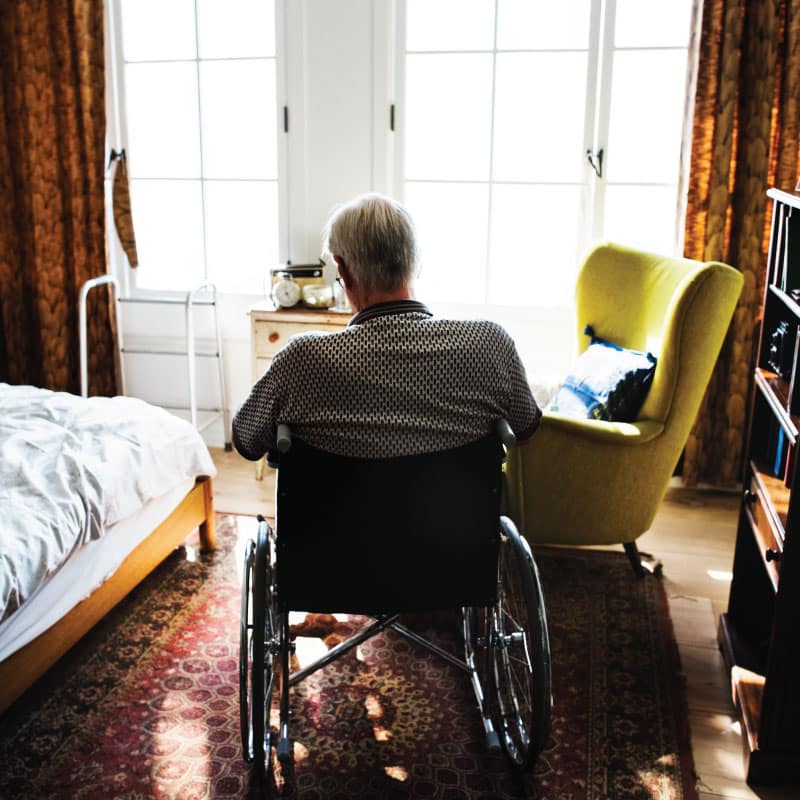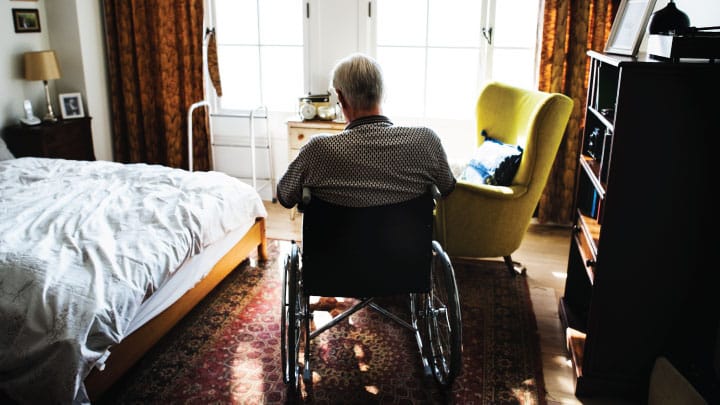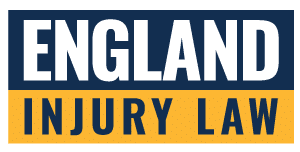Chattanooga Nursing Home Negligence Lawyer
Compassionate Legal Support for Nursing Home Negligence & Abuse Cases
If a loved one has suffered due to negligence or abuse in a nursing home, reach out to England Injury Law for a complimentary consultation to explore your legal rights and options.
Making the decision to place a loved one in a nursing home is never easy. It comes with the expectation that the facility will provide the utmost care and respect. Sadly, this trust is sometimes broken, and the care falls below the necessary standards, leading to cases of negligence and abuse in nursing homes. These heartbreaking situations may arise from various factors such as understaffing or inadequate training, but the impact on your loved one can be profound.
We understand the weight of these decisions and the pain that follows when the care promised is not delivered. Our team has experience in handling cases of Nursing Home Negligence and Nursing Home Abuse in Chattanooga.
We believe that every individual in a nursing home deserves to have a voice and be treated with dignity. If you suspect that your loved one has suffered due to negligence or abuse in a nursing facility, we encourage you to reach out to us.


It's Easy For You To Learn More
Contact Us
Dial 423-713-9225 or connect online.
Consultation
We'll answer all of your questions.
On Your Side
If we take the case, we get to work.
England Injury Law is committed to safeguarding the rights of the elderly and individuals who are unable to care for themselves.
Nursing homes are obligated to meet a specific standard of duty of care, which is a legal and ethical requirement to ensure the safety and well-being of their residents. This standard involves maintaining a safe environment, free from hazards that could cause harm.
It also includes staffing the facility with adequately trained and qualified individuals who can provide the necessary care and support to residents. This duty of care extends to all aspects of a resident’s life in the nursing home, from physical and medical care to emotional support and social interaction.
Adherence to this standard is not just a guideline but a fundamental responsibility, with the aim to safeguard the health, dignity, and rights of the elderly and vulnerable individuals in their care.
Statistical Insight into Nursing Home Abuse
Research by the National Center on Elder Abuse (NCEA) reveals a concerning statistic: roughly 10% of nursing home residents in the United States are subjected to some form of abuse.
This significant figure highlights the prevalence of abuse in nursing homes, underscoring the need for vigilance and proactive measures to protect this vulnerable population.
The Role of an Attorney in Nursing Home Negligence & Abuse Cases
In cases of nursing home negligence or abuse, having an attorney can be crucial.
An attorney can provide:
Guidance: Navigating the complexities of nursing home negligence cases can be challenging. An attorney can offer guidance, from experience, on the legal process, helping you understand your rights and the options available.
Investigation and Evidence Gathering: Attorneys have the resources to thoroughly investigate claims of negligence or abuse. They can gather essential evidence, including medical records, witness statements, and expert testimonies, to build a strong case.
Advocacy and Representation: An attorney can effectively represent your interests in negotiations or court proceedings, advocating for the best possible outcome for your loved one.
Navigating Compensation Claims: If your loved one has suffered due to negligence, an attorney can help in seeking fair compensation for medical expenses, pain and suffering, and other related costs.
Holding Facilities Accountable: By taking legal action, attorneys can hold nursing homes accountable for their actions, potentially preventing future instances of abuse or negligence.
In summary, an attorney plays a pivotal role in addressing nursing home negligence, providing the necessary legal support to ensure justice and accountability.
At England Injury Law, we are committed to assisting families through these challenging times with dedicated legal support.
Chattanooga Nursing Home Negligence FAQs
What are some types of nursing home negligence or abuse?
Nursing home negligence and abuse can manifest in various forms, impacting the well-being and dignity of residents. Following are five primary types of abuse and negligence identified in nursing homes:
Physical Abuse: This involves any form of physical force that can harm or distress a resident. It includes not just overt acts like hitting, pushing, or restraining but also more subtle forms such as the improper administration of medication. Physical abuse can lead to serious injuries or exacerbate existing health conditions.
Sexual Abuse: This type of abuse encompasses any non-consensual sexual interaction with a resident. It ranges from direct physical contact to non-contact actions like forcing a resident to undress or perform sexual acts. Sexual abuse in nursing homes is particularly egregious, violating both the physical and emotional integrity of residents.
Emotional or Psychological Abuse: This form of abuse includes actions that harm a resident’s emotional and psychological well-being. Examples are yelling, mocking, intimidating, or other verbal or non-verbal behaviors that inflict emotional pain, distress, or anguish. This type of abuse can be as damaging as physical abuse, significantly impacting a resident’s quality of life and mental health.
Financial Exploitation: This involves illegally or improperly using a resident’s financial resources. It can range from identity theft, unauthorized use of credit or debit cards, to stealing money or valuables. Financial exploitation not only affects the resident’s financial stability but also their sense of security and trust.
General Negligence: This category covers the failure to provide a safe and attentive environment, leading to injuries or harm. It includes situations where a resident is injured due to inattentive care, lack of supervision, inadequate maintenance of facilities, or failure to address health and safety hazards. This form of negligence can result in falls, bedsores, malnutrition, dehydration, or other serious health issues.
Each of these forms of abuse and negligence in nursing homes represents a serious violation of the rights and dignity of the elderly and vulnerable. It is important for family members to be vigilant and to seek legal assistance if they suspect any form of abuse or negligence.
England Injury Law is committed to providing guidance and support to families dealing with these challenging situations, ensuring that the rights of their loved ones are protected and upheld.
What are signs of nursing home negligence or abuse?
Recognizing signs of nursing home negligence or abuse is crucial for protecting your loved ones. Here are key indicators to watch for, categorized by the type of abuse or negligence:
Physical Abuse:
- Unexplained injuries like broken bones, sprains, bruises, dislocations, scars, or welts.
- Signs of restraint, such as marks on wrists and ankles.
- Damaged personal items, like broken glasses or jewelry.
- A caregiver insisting on being present and not allowing private conversations with your loved one.
Emotional Abuse:
- Noticeable changes in behavior or mood that are not typical for your loved one.
- Behavioral changes specifically in the presence of certain caregivers, reverting to normal when they leave.
Sexual Abuse:
- Changes in behavior or mood, similar to signs of emotional abuse.
- Physical indicators such as bruising around the breasts or genital area.
- Torn, stained, or bloody underwear.
Financial Exploitation:
- Unexplained withdrawals from bank accounts.
- Changes in important documents like insurance policies, titles, or wills.
- Missing money or valuables from the resident’s room.
- Unusual spending patterns, like new subscriptions or frequent ATM withdrawals.
General Negligence:
- Instances of your loved one being found wandering outside the facility unattended.
- Observations of an unsafe living environment within the facility.
- Lack of intervention by staff in situations where your loved one is being harassed or mistreated by other residents.
- Signs of poor personal care, such as inappropriate clothing for the weather, bedsores, or lack of hygiene.
It’s important to remember that these signs might not always be apparent or might be explained by other factors.
However, if you observe any of these indicators, it’s vital to take them seriously and consider seeking legal advice.
England Injury Law is here to provide guidance and support to families facing these distressing situations, ensuring that the rights and well-being of your loved ones are prioritized.
What should I do if I suspect abuse or negligence of my loved one in a nursing home?
If you suspect that your loved one is experiencing abuse or neglect in a nursing home, it’s crucial to take immediate and appropriate steps to ensure their safety and well-being.
Emergency Situations: If the situation is an emergency, call 911 immediately. Immediate intervention is crucial in cases where your loved one is in immediate danger.
Mandatory Reporting in Tennessee: Tennessee law requires anyone who suspects abuse or neglect of an elderly or vulnerable individual to report it. This is not just a moral obligation but a legal one.
Reporting to Adult Protective Services: To report suspected abuse or neglect, contact the Tennessee Department of Human Services’ Adult Protective Services unit at 888-277-8366. Reports can also be made online to Tennessee Adult Protective Services.
Contacting England Injury Law: After fulfilling your obligation to report the abuse or neglect, consider reaching out to England Injury Law. Our team can help you understand your loved one’s legal rights and options.
Increase Visitation and Observation: Visit your loved one more frequently. Increased visits can deter potential abusers and also give you a clearer picture of the ongoing care.
Documentation: Document everything. If there are physical signs of neglect or abuse, take photos. Make notes about your loved one’s behavior, any changes you observe, and interactions with staff. Write down any questions you have for the staff and their responses. Requesting and reviewing medical records is also a crucial step.
Follow-Up: After reporting and seeking legal advice, stay involved and monitor the situation closely. Follow up on your reports to ensure that proper actions are being taken.
Remember, taking these steps not only helps protect your loved one but also contributes to the safety and well-being of other residents in the facility.
What type of damages can be recovered in nursing home negligence or abuse claims?
In cases of nursing home abuse or negligence in Tennessee, victims and their families can seek several types of damages. These damages are intended to compensate for the various impacts of the abuse or negligence.
They include:
Medical Treatment Costs Arising from the Abuse or Neglect: This covers all medical expenses directly related to treating injuries or health issues caused by the abuse or negligence. It includes hospital stays, doctor visits, medication, and any other medical treatments necessary due to the incident.
Costs for Ongoing Medical Care: This includes expenses for long-term care needs that arise as a result of the abuse or neglect, such as physical therapy. These costs acknowledge that some injuries may require extended periods of treatment and rehabilitation.
Mental Health Care Expenses: Given the emotional and psychological impact of abuse and neglect, victims may require mental health care, including therapy or counseling. This type of damage covers the costs associated with addressing the psychological aftermath of the abuse or neglect.
Pain and Suffering: This is a non-economic damage that compensates for the physical pain and emotional distress suffered by the victim. Pain and suffering damages acknowledge that not all impacts of abuse or neglect can be measured in monetary terms, but they are significant and deserving of compensation.
Each case is unique, and the specific damages available can vary based on the circumstances of the abuse or neglect.
What if the abuse of my loved one is coming from another resident?
If the abuse in a nursing home is perpetrated by another resident, responsibility for ensuring the safety and well-being of all residents still lies with the nursing home.
In such situations, the facility is obligated to take appropriate measures, which may include:
Implementing Protective Strategies: The nursing home must assess the situation and develop strategies to prevent further abuse. This could involve ensuring that the offending resident and the victim do not have opportunities to interact.
Developing a Documented Plan: The facility should create a documented plan outlining the steps they will take to protect the residents. This plan is crucial as it serves as a record of the facility’s awareness of the issue and their intended actions to address it.
Liability of the Facility: Despite the abuse originating from another resident, the liability remains with the nursing home. If the facility fails to make a sincere and effective effort to prevent further abuse, they can be held liable for any damages resulting from their inaction.
Reporting and Legal Action: If you suspect this type of abuse, report it to the nursing home administration immediately. It’s vital that they are given the opportunity to address the issue. If the facility fails to take adequate measures to protect the residents, you may have legal grounds to pursue action against them.
It’s important to take any signs or suspicions of abuse seriously and act promptly.
What legal options are available if a loved one wanders away from a nursing home and gets injured?
The facility has a duty to ensure the safety of all its residents. This duty includes preventing situations where a resident could leave the facility unsupervised, especially if they are vulnerable or have conditions that impair their judgment, such as dementia.
In cases where a resident does wander off and is injured, the facility may be liable for failing to provide a safe environment. This could include a lack of adequate supervision, insufficient security measures, or failure to assess and manage the risks associated with each resident’s specific health conditions.
Why is it important to contact an attorney at the first signs of nursing home negligence?
Contacting an attorney at the first signs of nursing home negligence is important for several reasons:
Emotional Support and Clarity: Dealing with a situation where your loved one is potentially being neglected can be emotionally overwhelming. An attorney can provide you with peace of mind by explaining your legal options and the process involved in nursing home negligence cases. This guidance can help you navigate the situation more calmly.
Timely Action: The sooner an attorney is involved, the faster they can start working on protecting your loved one from further harm. Early legal intervention can also be crucial in preserving evidence and testimonies that are essential for building a strong case.
Protecting Your Loved One and Others: By addressing the issue legally, you not only work towards securing the safety and rights of your loved one but also potentially protect other residents in the facility. Some residents may not have frequent visitors or advocates to notice or report their mistreatment, so your action could be instrumental in preventing further abuse or negligence.
Legal Matters: Nursing home negligence cases can be legally complex and challenging to handle without professional assistance. An attorney can ensure compliance with legal procedures and regulations.
Seeking Justice and Accountability: An attorney can help ensure that the nursing home is held accountable for their actions or lack thereof. This not only seeks justice for your loved one but also serves as a deterrent against future negligence or abuse in the facility.
How much will it cost to begin a nursing home negligence or abuse case with your firm?
Starting a nursing home negligence case with England Injury Law comes with no upfront cost to you.
We handle our Nursing Home Negligence and Abuse cases on a contingency fee basis.
This arrangement means that our legal fees are contingent upon securing a settlement or judgment in your favor.
In other words, payment for our services is deducted from the final settlement or judgment awarded in the case against the nursing home facility.
This approach allows you to pursue justice for your loved one without the burden of immediate legal fees.






